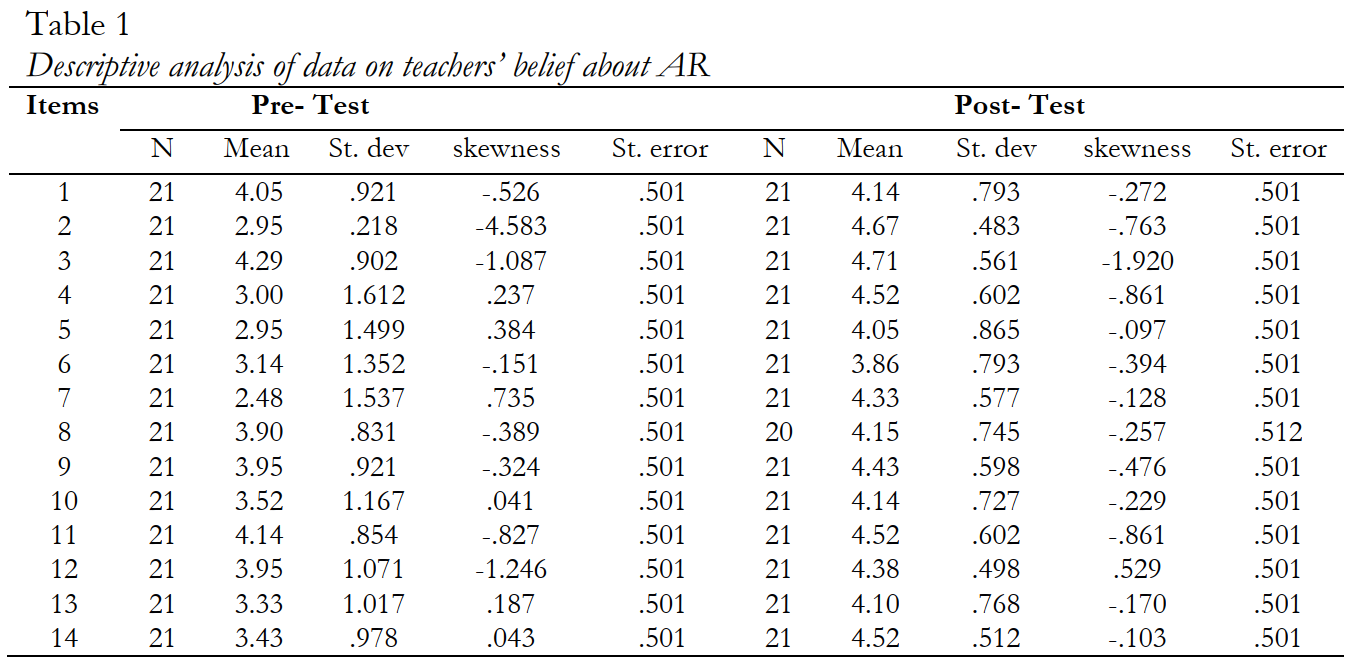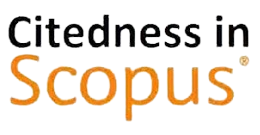The effect of CAR on English language teachers’ beliefs about action research
DOI:
https://doi.org/10.33474/j-reall.v5i1.21431Keywords:
action research, collaborative action research, teachers’ beliefsAbstract
This study examined the effect of collaborative action research (CAR) on secondary school English language teachers' beliefs about and perceived competency in conducting action research. A quasi-experimental design with pre- and post-test measures within a single group was employed. The intervention involved a one-day training workshop followed by 15 months of active CAR engagement. Data were collected via questionnaires from 37 English language teachers (21 in the experimental group and 16 in the control group) at two secondary schools in Mettu town, Ethiopia. The results revealed a positive transformative effect of CAR on teachers’ beliefs about action research. Their perceived competency in conducting action research as part of their teaching duties also improved significantly. These findings suggest that CAR empowers teachers to become self-directed, collaborative problem solvers within their classrooms rather than passively waiting for external solutions. However, the study’s limitations, including its single-group design and focus on two schools, necessitate further research. Future studies, particularly in-depth qualitative investigations, are recommended to explore the practical changes in teaching practices driven by CAR and to diversify the subject group and research methods for broader insights.
References
Abebe, A., & Desta, A. (2023). Action research as a tool for improving English language teachers' teaching practices in Ethiopian secondary schools. English Language Teaching Journal, 77(1), 1-13. https://doi.org.10.1093/elt/ccac001
Aslam, M. S., & Khan, H. A. (2022). The role of culture, upbringing, and personal experiences in shaping teachers’ beliefs about language teaching and learning. Journal of Language, Teaching and Research, 13(1), 34-48. https://doi.10.17507/jltr.1301.04
Bailey, K. M. (1992). The processes of innovation in language teacher development: What, why and how teachers change. In J. Flowerdew, M. Brock, & S. Hsia (Eds.), Perspectives on Second Language Teacher Education (pp. 253-282). Hong Kong: City Polytechnic of Hong Kong.
Banegas, D. (2012). Teacher professional development through collaborative action research: Impact on foreign English language teaching and learning. Educational Action Research, 21(2), 185-201. https://doi.10.1080/09650792.2012.662312
Bryan, B. (2012). Teacher beliefs in action: A practical guide to developing effective teaching. Routledge
Burns, A. (2005). Action research: An evolving paradigm? Language Teaching, 38(2), 57–74. http://doi.org.10.1017/S0261444805220043
Burns, A. (2010). Doing Action Research in English Language Teaching: A Guide for Practitioners. New York/London: Routledge
Cochran-Smith, M., & Lytle, C. (1993). Inside/outside: Teacher research and knowledge. New York/London: Teachers College Press
Cohen, L., Manion, L., & Morrison, K. (2005). Research methods in education (5th ed.). London: Routledge
Cohen-Cole, M. (2022). The shifting sands of belief: Towards a more nuanced understanding of belief change. In S. D. O’Brien & J. A. Sloman (Eds.), Beliefs: Perspectives on theory and research (pp. 21-42). London: Oxford University Press.
Creswell, J. W. (2008). Educational research: Planning, conducting, and evaluating quantitative and qualitative research (3rd ed.). Boston: Pearson Merrill/Prentice Hall
Creswell, J. W. (2012). Educational research: Planning, conducting, and evaluating quantitative and qualitative research (4th ed.). Boston: Pearson Inc
Darling-Hammond, L. (2006). Constructing 21st-century teacher education. Journal of Teacher Education, 57(3), 300-314. https://doi.org.10.1177/0022487105285962
Darling-Hammond, L., Annenberg Institute for School Reform, & Carnegie Foundation for the Advancement of Teaching. (2009). Developing a professional system for teaching and learning: A design guide. John Wiley & Sons.
Desta, A. (2018). Challenges and opportunities of action research in Ethiopian primary schools. International Journal of Research in Education and Science (IJRES), 4(1), 127-138.
https://doi.org.10.21890/ijres.388600
Elliot, J. (1991). Action Research for Educational Change. Open University Press. Philadelphia: Routledge
Field, A. (2013). Discovering statistics using IBM SPSS statistics (4th ed.). Thousand Oaks, CA: SAGE Publications. https://doi.org/10.4236/jmp.2016.79090
Fullan, M., & Hargreaves, A. (2018). Professional capital: A systemic approach to teacher collaboration and school improvement. Journal of Educational Change, 19(1), 1-20. doi: https://10.1186/s11869-017-0725-2
Glogovits, I. (2002). Action research on teacher education: Learning through the Loop. International Journal of Qualitative Studies in Education, 15(4), 405-42.
https://doi.org.10.1080/09518390210137038
Guskey, T. R. (2002). Evaluating professional development. Corwin Press. ISBN-13: 978-0761946965
Hoque, E. (2016). Three domains of learning: Cognitive, affective, and psychomotor. Journal of EFL Education and Research (JEFLER), 2(2)
Jabessa, F. (2015). Action research practices of English as a foreign language (EFL) teachers at two Ethiopian public universities. Ethiopian Journal of Education Sciences, 10(2), 113-131. https://doi.org.10.4314/ejesc.v10i2.9
Kemmis, S., & McTaggart, R. (2005). Participatory action research: Living the change. Sage Publications.
Kemmis, S., & McTaggart, R. (1988). The action research planner. Geelong, Australia: Deakin University Press.
Khan, N. (2020). Teachers’ beliefs and practices: A critical review of the literature. Educational Research and Reviews, 15(1), 1-14. https://doi.org.10.5897/ERR2019.3836
Korthagen, F.A.J., Kessels, J., Koster, B., Lagerwerf, B., & Wubbels, T. (2001). Linking practice and theory: The pedagogy of realistic teacher education. Mahwah, NJ: Lawrence Erlbaum Associates
Kothari, C.R. (2004). Research Methodology: Methods and Techniques. New Delhi: New Age International Publisher
Kumar, C. P. (2013). The eclectic method: Theory and its application to the learning of English. International Journal of Scientific and Research Publications, 3(6), 1-4.
Kutlay, A. (2012). Why do teachers not do research? The case of English language teachers in Turkey. Teaching and Teacher Education, 28(8), 1040-1047.
https://doi.org.10.1016/j.tate.2012.06.001
Lakkala, S., Galkiene, A., Navaitiene, J., Cierpiałowska, T., Tomecek, S., Uusiautti, S. T. (2021). Teachers supporting students in collaborative ways—an analysis of collaborative work creating supportive learning environments for every student in a school: Cases from Austria, Finland, Lithuania, and Poland. Sustainability. 13(5), 2804; https://doi.org/10.3390/su13052804
Littleton, H., & Belikov, O. (2019). Improving student engagement in science through action research. Journal of Educational Action Research, 12(3), 245-260. https://doi.10.1080/0965079X.2019.1688222
McNiff, J., & Whitehead, J. (2001). Understanding action research. Routledge. ISBN 978-0750708732
McNiff, J., & Whitehead, J. (2012). Action research for teachers: A practical guide (2nd ed.). Routledge. https://doi.org/10.4324/9780203462393
Mills, G., & O’Toole, J. (2009). Building critical reflection through collaborative action research: A case study of teachers of English as a second language. TESL Canada Journal, 26(2), 3-18. https://doi.org.10.18806/tesl.v26i2.932
MoCS (Ministry of Civil Service). (2012). Teachers' Career Structure Policy. Federal Democratic Republic of Ethiopia.
Nunan, D. (1992). Action research in the language classroom. Language Teaching, 25(1), 3-22.
https://doi.10.26634/jet.3.2.735
Ponte, P., & Chapman, A. (2014). Action research for English language teachers: A guide for reflective teaching. Cambridge University Press.
Prihadi, D. N. (2022). Exploring EFL teachers’ beliefs and practices in teaching speaking. CELTIC Journal of Culture, English Language Teaching, Literature, and Linguistics, 9(2), 101-118. https://doi.10.24167/celtic. v9i2.3111
Rahmah, N., & Hartono, H. (2023). English language teachers’ beliefs and their teaching practices: A case study of Indonesian secondary schools. Celt: Journal of English Language Teaching and Linguistics, 7(3), 1-21. https://doi.10.24167/celt.v7i3.2924
Richards, J. C., & Rodgers, T. S. (2001). Approaches and methods in language teaching (2nd ed.). Cambridge: Cambridge University Press.
Richards, J. C., & Rodgers, T. S. (2014). Approaches and methods in language teaching (3rd ed.). Cambridge: Cambridge University Press
Richards, J. C., & Farrell, T. S. C. (2005). Professional development for language teachers: Strategies for teacher learning. Cambridge University Press. https://doi. 10.1093/elt/ccl014
Richardson, V. (2017). The importance of teacher beliefs. Teachers and Teaching: Theory and Practice, 22(4), 403-418. https://doi.org.10.1080/09630554.2016
Rukiya, H. (2016). Female teachers’ professional development through action research practice. Journal of Education and Practice, 7(22). https://doi.org/10.7176/JEP
Skerritt, O. Z. (1996). New directions in action research. Falmer. https://doi.org/10.4324/9780203392935
Syafii, M. L. (2021). Challenges and opportunities of action research in English language teaching. Celt: Journal of Culture, English Language Teaching, Literature, and Linguistics, 8(1), 1-10. https://doi.org/10.24167/celt.v8i1.3829
Tadesse, F., & Firdissa, J. (2022). The impact of action research on English language teachers’ professional development in Ethiopian public universities. Journal of Teacher Education for Sustainability, 28(1), 1-17. https://doi.10.2478/jtes.
Tanjung, P. A., & Ashadi. (2019). Differentiated instruction in accommodating individual differences of EFL students. Celtic: A Journal of Culture, English Language Teaching, Literature and Linguistics, 6(2), 246-25. https://doi.org/10.22219/celtic.v6i2.9941
Tomal, D. R. (2003). Action Research for Educators. Lanham/Maryland/Oxforf: Scarecrow Press Inc.
Whitehead, J. (2022). Action research in education: Making a difference in practice. London: Bloomsbury Publishing
Woodland, R., Lee, M. K., & Randall, J. (2013). A validation study of the teacher collaboration assessment survey. Education Research and Evaluation: An International Journal on Theory and Practice, 19(5), 442-460. https://doi.org/10.1080/13803611.2013.795118
Woolhouse, M. (2005). ‘You can’t do it on your own: Gardening as an analogy for personal learning from a collaborative action research group’. Educational Action Research, 13(1), 27–41. https://doi.org./10.1080/09650790500200353
Yin, R. K. (2023). Case study research and design (7th ed.). London/New Delhi: Sage Publications
Zhao, K., Chen, X., & Whalen, S. (2023). The role of beliefs and self-efficacy in predicting learning strategy use. Learning and Individual Differences, 108, 103895.

Downloads
Published
How to Cite
Issue
Section
License
Copyright (c) 2024 Ayele Legesse, Tamene Kitila (PhD)

This work is licensed under a Creative Commons Attribution 4.0 International License.
Authors who publish this journal agree to the following terms:
- Authors retain copyright and grant the journal right of first publication with the work simultaneously licensed under a Creative Commons Attribution License that allows others to share the work with an acknowledgement of the work's authorship and initial publication in this journal.
- Authors can separately make additional contractual arrangements for non-exclusive distribution published by the journal (e.g., publish it in a book), with an acknowledgement of its initial publication in this journal.
- Authors are allowed and encouraged to send their work via online (e.g., in the institutional repositories or their website) after published by the journal.





















